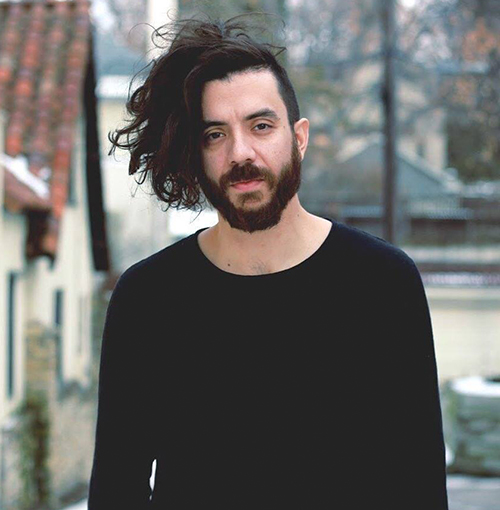National Poetry Month 2018: 5 Questions with Kaveh Akbar
April 11, 2018Kaveh Akbar’s poems appear in The New Yorker, Poetry, The New York Times, The Nation, Tin House, Best American Poetry 2018, The New Republic, The Guardian, Ploughshares, PBS NewsHour,…

Kaveh Akbar’s poems appear in The New Yorker, Poetry, The New York Times, The Nation, Tin House, Best American Poetry 2018, The New Republic, The Guardian, Ploughshares, PBS NewsHour, American Poetry Review, Poetry International, and elsewhere. His debut collection, Calling a Wolf a Wolf, was published by Alice James Books in the US and Penguin in the UK. The recipient of a 2016 Ruth Lilly and Dorothy Sargent Rosenberg Fellowship from the Poetry Foundation, a Pushcart Prize, and the Lucille Medwick Memorial Award from the Poetry Society of America, Kaveh was born in Tehran, Iran. He is the editor of Divedapper and currently teaches at Purdue University.
Adrian Matejka: Kaveh, thanks so much for answering some questions about metaphor. I know you’re a busy dude between traveling for your beautiful new book, Calling a Wolf a Wolf, and your new appointment at Purdue University. Congratulations on all of it! Let’s start with the basics. How do you define metaphor and what do you think its main function in is a poem?
Kaveh Akbar: Adrian! It is always a privilege to get to talk with you, thanks for thinking of me for this. If “define metaphor” is the basics, the hard stuff is gonna get really tough! Really though, I think metaphors are incredibly slippery things. To my mind, the membranes between symbols, images, and metaphors are thin and endlessly permeable. I like to talk with my students about how the word “metaphor” comes from the Greek word for “to transfer.” That’s the heart of it—a metaphor always transfers some force (connotative, denotative, psychic, emotional, spiritual, ecological, cosmic, other) between two or more things.
AM: Transference is a wonderful way to think about metaphor. One kind of language lending its muscle to another. Can you talk a little bit about how that transference might be used to make a poem more potent? I mean, what does a metaphor actually add to the poem for the reader?
KA: It means you can call in entire worlds of association, economically add extra valences of meaning with just a few words. To open “Prufrock,” Eliot writes, “Let us go then, you and I, / When the evening is spread out against the sky / Like a patient etherized upon a table.” The metaphor gives us all the connotative grain of “a patient etherized upon a table.” It’s not just a gray sky, not a gloomy evening—the entire world is made medical, unsafe, stuck between waking and sleep, by the precision of Eliot’s comparison. That texture, that depth, is what a good metaphor can do!
AM: Does metaphor in poetry work in comparison to other art forms–metaphors in movies for example, or metaphors in dance? How do they operate the same or differently?
KA: Good metaphor always works to shake us out of our complacency, our received or unchallenged thinking about the world. I’ve been obsessed lately with Viktor Shklovsky, the great Russian defamiliarist. In his manifesto, “Art as Technique,” he wrote, “Habitualization devours work, clothes, furniture, one’s wife, and the fear of war… art exists that one may recover the sensation of life.” This is what a metaphor (in any medium!) does for us—recovers some texture, relationship, correspondence between elements of our living that we may have otherwise forgotten or discarded.
AM: I love the idea of metaphor recovering connections we might have forgotten or left behind. Is there a specific metaphor in one of your poems that recovers a memory you’d forgotten? Or maybe to put it slightly differently, is there metaphor in one of your poems that completely surprised you with what it evokes?
KA: Oh man, this is such a good question. The one that immediately leapt to mind is from the poem “What Seems Like Joy,” where I say: “sometimes I feel beautiful and near dying / like a feather on an arrow shot through a neck.” For much of my life, the moments where I felt best, most self-assured, most beautiful, yes, were the moments when danger was most imminent. When I struck upon the image of the feather on an arrow shot through a neck, it came with the shock of complete recognition, the frisson of being given a portal back into a person I used to be. Certain poems and metaphors from my book still give me that kind of uncanniness, that being-again.
AM: I know you are a capacious reader, so this might be a tough one: What is your favorite extended metaphor in contemporary poetry? What makes that specific example so resonant for you? Can you give us a couple of other examples—maybe of both local metaphor and extended metaphor?
KA: Oh man, that’s such a huge question! I have so many favorites, but the one that immediately leapt to mind as soon as I read your question was Heather Christle’s “People Are a Living Structure Like a Coral Reef.” The whole poem is full of defamiliarist wonder (“I love people / very much They are everywhere!”) but I think about its title every time I am in a crowd. It’s like a social anxiety pacifier, imagining the throngs as colorful bits of coral happily swaying in the ocean. “Oh people You have to love / people They are so much like ourselves”. You repeat that to yourself, and it’s hard to feel anything but delight.
Other titans of metaphor in contemporary? Carl Phillips is a treasure trove. James Tate. Patricia Smith. Gabrielle Calvocoressi. Eduardo C. Corral. Traci Brimhall. Aimee Nezhukumatathil. Ellen Bryant Voigt. I was just rereading Tiana Clark’s manuscript for her forthcoming I Can’t Talk About the Trees Without the Blood, and good lord, she’s got some haymakers in there too.
WHAT SEEMS LIKE JOY by Kaveh Akbar
how much history is enough history before we can agree
to flee our daycares to wash everything away and start over
leaving laptops to be lost in the wet along with housecats and Christ’s
own mother even a lobster climbs away from its shell a few
times a life but every time I open my eyes I find
I am still inside myself each epiphany dull and familiar
oh now I am barefoot oh now I am lighting the wrong end
of a cigarette I just want to be shaken new like a flag whipping
away its dust want to pull out each of my teeth
and replace them with jewels I’m told what seems like joy
is often joy that the soul lives in the throat plinking
like a copper bell I’ve been so young for so long
it’s all starting to jumble together joy jeweling copper
its plink a throat sometimes I feel beautiful and near dying
like a feather on an arrow shot through a neck other times
I feel tasked only with my own soreness like a scab on the roof
of a mouth my father believed in gardens delighting
at burying each thing in its potential for growth some years
the soil was so hard the water seeped down slower than the green
seeped up still he’d say if you’re not happy in your own yard
you won’t be happy anywhere I’ve never had a yard but I’ve had apartments
where water pipes burst above my head where I’ve scrubbed
a lover’s blood from the kitchen tile such cleaning
takes so long you expect there to be confetti at the end
what we’ll need in the next life toothpaste party hats
and animal bones every day people charge out of this world
squealing so long human behavior! goodbye acres
of germless chrome! it seems gaudy for them to be so cavalier
with their bliss while I’m still here lurching into my labor
hanging by my hair from the roof of a chapel churchlight thickening
around me or wandering into the woods to pull apart eggshells emptying
them in the dirt then sewing them back together to dry in the sun
What Seems Like Joy first appeared in Field.
Indiana Humanities is celebrating National Poetry Month in collaboration with Indiana Poet Laureate Adrian Matejka. We’ll be sharing interviews with Indiana poets, discussion on poetic form and other poetry. See the full span on National Poetry Month posts here.  Adrian Matejka is the Indiana Poet Laureate and is the author of The Big Smoke, Map to the Stars and many other works.
Adrian Matejka is the Indiana Poet Laureate and is the author of The Big Smoke, Map to the Stars and many other works.


